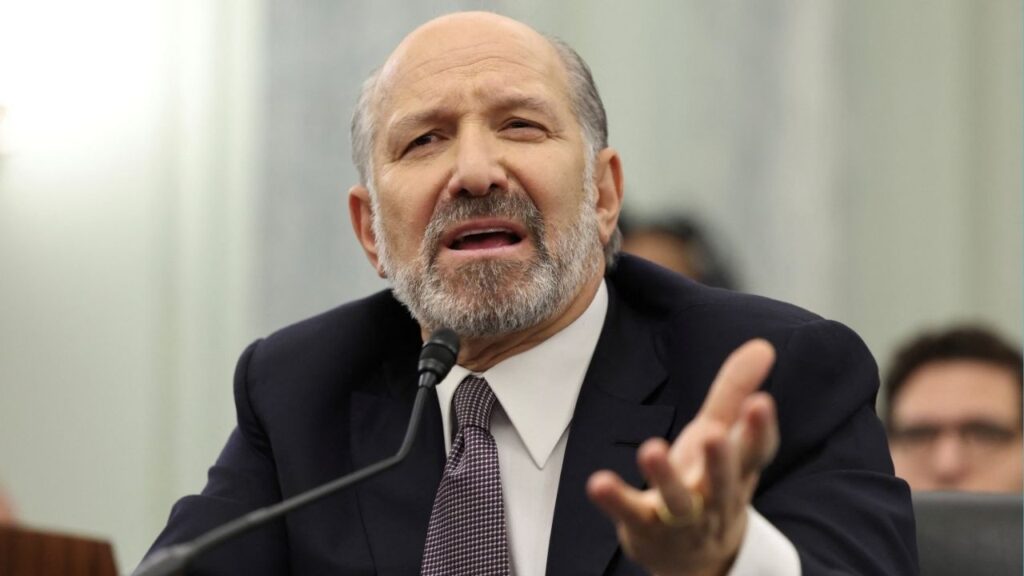The Justice Department and Google make final arguments in a high-stakes antitrust lawsuit. The case revolves around Google's dominance as a search engine and its contracts with other companies. (AP File)

- Google's dominance as a search engine is under scrutiny in a high-stakes antitrust lawsuit.
- The tech giant spends over $20 billion annually to maintain its position.
- Google argues that its dominance is due to its superior service.
Share
|
Getting your Trinity Audio player ready...
|
WASHINGTON — Google’s preeminence as an internet search engine is an illegal monopoly propped up by more than $20 billion spent each year by the tech giant to lock out competition, Justice Department lawyers argued at the closings of a high-stakes antitrust lawsuit.
Google, on the other hand, maintains that its ubiquity flows from its excellence, and its ability to deliver results customers are looking for.
The U.S. government, a coalition of states and Google all made their closing arguments Friday in the 10-week lawsuit to U.S. District Judge Amit Mehta, who must now decide whether Google broke the law in maintaining a monopoly status as a search engine.
Google’s Strength and Contracts
Much of the case, has revolved around how much Google derives its strength from contracts it has in place with companies like Apple to make Google the default search engine preloaded on cellphones and computers.
At trial, evidence showed that Google spends more than $20 billion a year on such contracts. Justice Department lawyers have said the huge sum is indicative of how important it is for Google to make itself the default search engine and block competitors from getting a foothold.
Google responds that customers could easily click away to other search engines if they wanted, but that consumers invariably prefer Google. Companies like Apple testified at trial that they partner with Google because they consider its search engine to be superior.
Related Story: Google Fires More Workers Who Protested Its Deal With Israel
Google’s Market Definition
Google also argues that the government defines the search engine market too narrowly. While it does hold a dominant position over other general search engines like Bing and Yahoo, Google says it faces much more intense competition when consumers make targeted searches. For instance, the tech giant says shoppers may be more likely to search for products on Amazon than Google, vacation planners may run their searches on AirBnB, and hungry diners may be more likely to search for a restaurant on Yelp.
And Google has said that social media companies like Facebook and TikTok also present fierce competition.
Google’s Ad Revenue and Market Strength
During Friday’s arguments, Mehta questioned whether some of those other companies are really in the same market. He said social media companies can generate ad revenue by trying to present ads that seem to match a consumer’s interest. But he said Google has the ability to place ads in front of consumers in direct response to queries they submit.
“It’s only Google where we can see that directly declared intent,” Mehta said.
Google’s lawyer, John Schmidtlein, responded that social media companies “have lots and lots of information about your interests that I would say is just as powerful.”
The company has also argued that its market strength is tenuous as the internet continually remakes itself. It noted that many experts once considered it irrefutable that Yahoo would always be dominant in search. Today, it said that younger tech consumers sometimes think of Google as “Grandpa Google.”
Related Story: Google Parent Reports Another Quarter of Robust Growth, Rolls Out First-Ever ...
While Google’s search services are free to consumers, the company generates revenue from searches by selling ads that accompany a user’s search results.
Justice Department attorney David Dahlquist said during Friday’s arguments that Google was able to increase its ad revenue through growth in the number of queries submitted until about 2015 when query growth slowed and they needed to make more money on each search.
The government argues that Google’s search engine monopoly allows it to charge artificially higher prices to advertisers, which eventually carry over to consumers.
“Price increases should be bounded by competition,” Dahlquist said. “It should be the market deciding what the price increases are.”
Dahlquist said internal Google documents show that the company, unencumbered by any real competition, began tweaking its ad algorithms to sometimes provide worse search ad results to users if it would increase revenue.
Google’s lawyer, Schmidtlein, said the record shows that its search ads have become more effective and more helpful to consumers over time, increasing from a 10% click rate to 30%.
Mehta has not yet said when he will rule, though there is an expectation that it may take several months.
If he finds that Google violated the law, he would then schedule a “remedies” phase of the trial to determine what should be done to bolster competition in the search-engine market. The government has not yet said what kind of remedy it would seek.



















